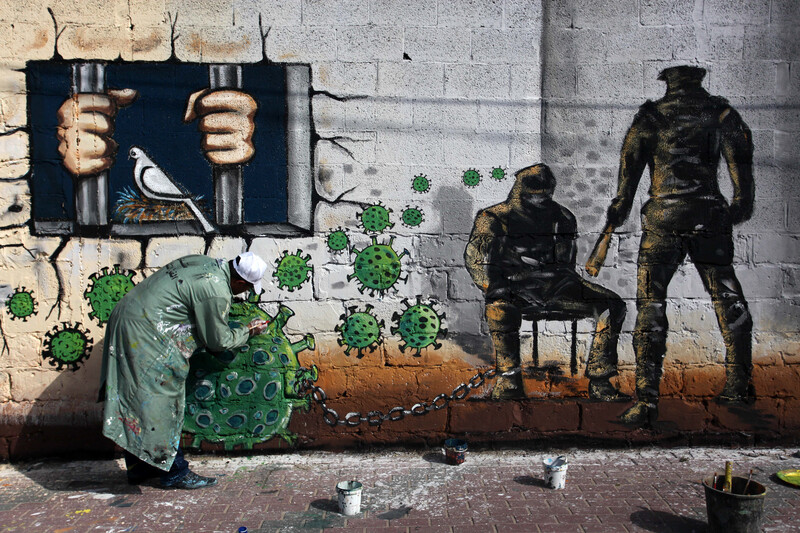Rights and Accountability 23 April 2020

A Palestinian artist in Gaza City paints a mural in support of Palestinians held in Israeli jails during the COVID-19 pandemic, on 20 April.
APA imagesIsrael has detained more Palestinian children in recent months despite the global pandemic.
Meanwhile, a Palestinian man died in an Israeli prison on Wednesday.
At the end of March, there were 194 Palestinian children in Israeli prisons.
That is a six percent increase from January, according to Defense for Children International Palestine.
Sixty percent are in pre-trial detention, which Ayed Abu Eqtaish, an advocate with the rights group, called “unconscionable given the increased risk presented by COVID-19.”
Israel is the only country in the world that systematically subjects children – and only Palestinian children – to military tribunals. US lawmakers have in recent years introduced legislation in an effort to curb these abuses.
Abu Eqtaish reiterated DCI Palestine’s calls to release all Palestinian children from Israeli jails immediately.
Israel has ignored appeals by human rights groups to end its night raids and arbitrary arrests in the occupied West Bank and release more than 1,000 particularly vulnerable Palestinians.
They include children, women, seniors, persons with illnesses and those held in administrative detention – without charge or trial.
The World Health Organization and other United Nations agencies have made repeated calls and issued guidelines to prevent the spread of the virus in detention and institutional settings.
But Israel has taken “no steps to release Palestinian prisoners and detainees or to adequately mitigate and prevent a COVID-19 outbreak in prisons,” prisoners rights group Addameer recently stated.
“Breeding grounds”
There have been international calls to reduce incarcerated populations – as prisons have become major hotspots for spreading the new coronavirus.
Addameer said COVID-19 “presents a particularly acute and immediate danger to Palestinian prisoners and detainees.”
Israel subjects Palestinians to systematic torture, medical neglect, overcrowding and lack of proper ventilation.
It also habitually denies them access to sanitary products, including sanitizers and disinfectants.
Those conditions make “Israeli prisons dangerous breeding grounds for COVID-19,” Addameer stated.
There are around 5,000 Palestinian detainees in Israeli prisons. More than 400 of them are held without charge or trial.
Hundreds suffer from chronic illnesses, Addameer reported.
Death in Israeli prison
A Palestinian man died in Israeli prison on Wednesday.
Nour Jaber al-Barghouti, 23, lost consciousness in the bathroom in the Negev prison where he is held in southern Israel, according to the Palestinian Prisoners Club.
He was not given assistance by prison authorities for half an hour until prisoners in the section started screaming.
Al-Barghouti is from the village of Aboud, near Ramallah in the occupied West Bank. He has been imprisoned for four years of an eight-year sentence.
The Palestinian Prisoners Club said it holds the Israeli prison administration “fully responsible for the death of Nour Jaber al-Barghouti and for its failure and deliberate delay in saving his life.”
Al-Barghouti’s death brings to 223 the number of Palestinians who have died in Israeli prisons since 1967.
Israel is still withholding the bodies of five prisoners, four of whom died since 2018.
Prisoner exchange?
Meanwhile, there has been renewed optimism in recent days of a prisoner exchange between Israel and Palestinian resistance organization Hamas, after Prime Minister Benjamin Netanyahu and rival Benny Gantz agreed to form a unity government last week, according to the Lebanese newspaper Al-Akhbar.
Negotiations for a possible exchange would be mediated by Egypt, an unnamed Hamas source told the newspaper.
Egypt released four Palestinian prisoners as a gesture of goodwill last week.





Comments
It's in these times, we need
Permalink Con Carroll replied on
It's in these times, we need to stand in solidarity, refusing to remain silent, be complicit in war crimes
Add new comment